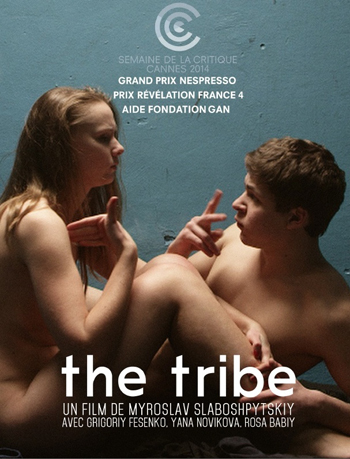L'Etrange 2014 Review: THE TRIBE, No Sound, But A Whole Lot Of Fury

The film presents a series of familiar conventions in a stunningly unfamiliar way, but ultimately leaves one feeling rather cold. While the lack of spoken-word sound is more than made up for in abundant fury, The Tribe, if not quite signifying nothing, never adds up to anything greater than the sum of its admittedly novel parts.
The film's protagonist, insofar as it has one, is Sergey (Grigory Fesenko), a young deaf-mute newly enrolled in a rundown school catering to his disability. Though the film opens and closes on him, and we follow him hazed by his fellow students, brought into the reigning gang and ushered into their world of petty crime, Slaboshpytskiy's camera is none too loyal, abandoning Sergey for long stretches on end to follow several of the other students and staff haunting the dilapidated school's corridors. Among them several members of the titular tribe, two female classmates working the truck-stop circuit as ladies of the night, and the woodshop teacher who is either facilitating the gangland activities or secretly running them. All of them, up to and including Sergey, remain silent and unnamed.
Though much has been made about the decision not to subtitle the Ukrainian sign language 'dialogue', it becomes immediately clear that woozy state it produces is very much the intended effect. The kids of the school, almost all of them deaf-mute non-actors themselves, exist in a world simply outside of our own, like ghosts in a liminal plain. The only contact they have with the quote unquote outside world is with the marks they rob and johns they pimp. The criminal activities have seemingly no consequences, neither from greater society nor the invisible school officials. Watching the gang stalk a rich man through a park and then party with his spoils, one gets the impression that their shared disadvantage is in fact an otherworldly edge.
Slaboshpytskiy's interest is in world building, or, better put, in fleshing out the details of this slightly alien world where boundaries as we understand them don't exist. Because the doors of the dormitories don't lock, and any knock would go unheard, characters waltz freely from room to hallway to room, the ever present steadicam following them as they barrel from situations public to the intimately almost embarrassingly private in one fell swoop.
Without the benefit of speech, the characters communicate exclusively through sight and touch - creating a bluntly physical environment that prioritizes seeing and being seen. The dangers of falling out of sight may well cost you your life, as one poor sap learns when he stalks off to smoke a cigarette behind a stationed truck, oblivious to the fact the truck is backing up towards him. It is an illustrative sequence, told in an endless shot that has the viewer marveling at the technical skill while gasping at the gruesome act plainly depicted.

And that's basically the entirety of Slaboshpytskiy's MO, following these characters who must always be seen in long, painstakingly choreographed takes, and never looking away from the violence and sexuality and toxic combination of the two that erupts within them. For one character, a sexual encounter leads to a positive pregnancy test leads to a back-alley abortion, and we follow this progression, from the safe distance of medium to long shots in three unbroken takes, with clinical remove and an unwavering eye. It has the effect of being both startling and numbing at the same time.
Startling and numbing seems about the perfect way to describe the film. Because the violence just lands consequence free (even the abortion, depicted as the ultimate violent act, is kind of quickly forgot), it just leads to more of the same. I suppose that "in a vacuum, savagery begets more savagery" is a fine and noble theme, but it is one broached early and often, and then reiterated again and again and again.
Ultimately, the film's real message is just a testament to its own remarkable style. That's not bad; it makes for a captivating watch, and writing about it a delight. Though if you really get down to it, I don't think The Tribe has that much to say.

Do you feel this content is inappropriate or infringes upon your rights? Click here to report it, or see our DMCA policy.






